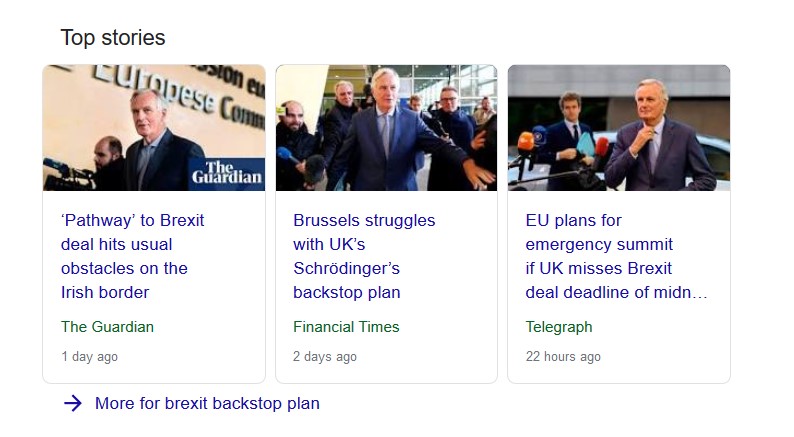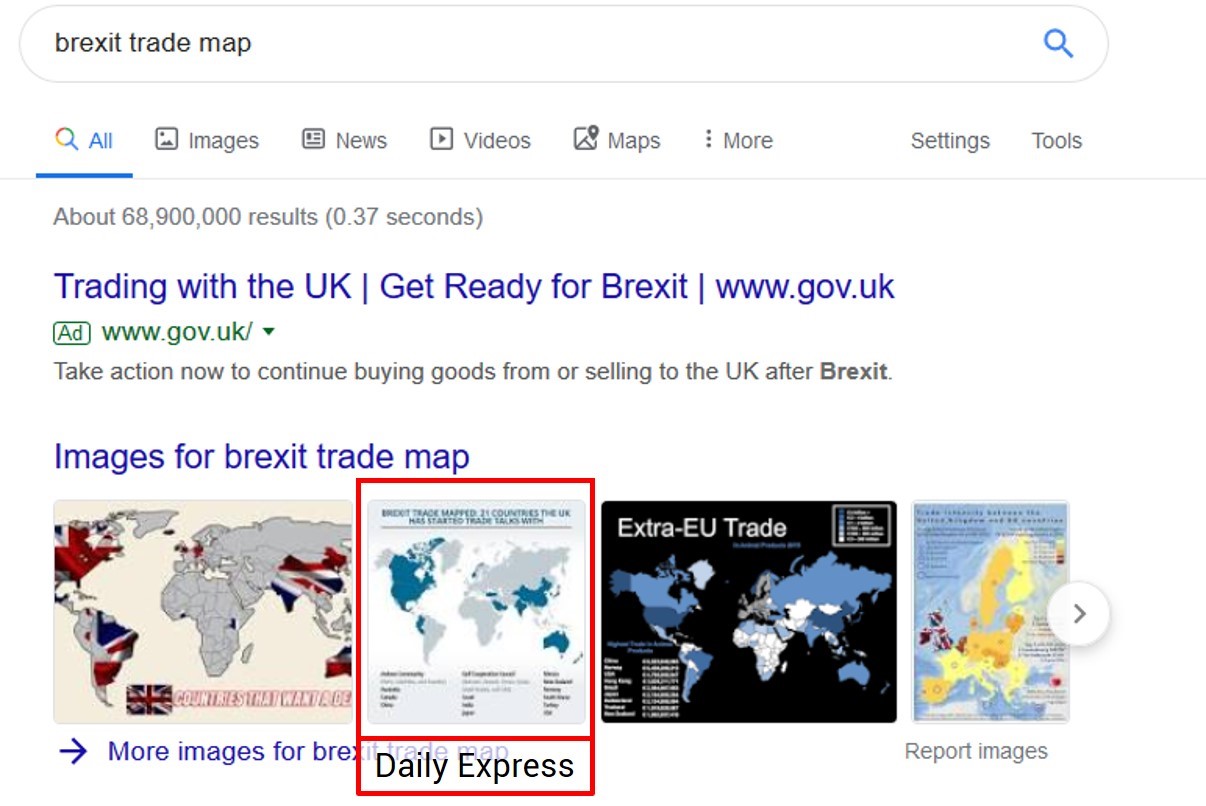The backstop. The impact on the pound. Citizens’ rights. The world of Brexit is full of complex topics that journalists, commentators and politicians have spent years trying to explain to the public and put their individual spin on. With the apparent Brexit deadline, parliamentary arithmetic and negotiation positions changing so often, it’s no wonder that people turn to Google to look for answers to their questions and information they can trust. In this analysis, we explore the BBC’s dominance of the Brexit search market, look at how the Guardian is the leading national newspaper for Brexit topics and investigate which websites are providing visual content for Google’s image boxes.
Want to stay up-to-date on Google news and get all our latest analysis direct to your inbox? Then subscribe now to receive our monthly search and content marketing email newsletter:
Study background
For this analysis, we created a keyword set of approximately 5,000 Brexit-related search terms, and investigated which websites rank for these keywords in the Google.co.uk search results for searches in the United Kingdom. The keyword set includes topics related to all aspects of Brexit, but more precise categorization also allows for a closer analysis of subjects such as “no deal Brexit”. The following table shows a few example keywords used for this study.
| Brexit general | No deal Brexit | Brexit questions |
| Brexit border issue | No deal Brexit yellowhammer | What will happen if brexit is blocked? |
| Background on Brexit | Brexit no deal consequences | Can Brexit be cancelled? |
| Brexit and farming | No deal Brexit explained | What happens after Brexit? |
| Brexit pound news | Impact of no deal Brexit | What is the backstop in Brexit negotiations? |
| Brexit EU citizens | News Brexit no deal | What happens to migrants after Brexit? |
The analysis was conducted in October 2019, and is based on desktop Google searches.
Market share: The BBC dominates searches for Brexit topics
The first part of our analysis takes a broad look at the Brexit search market. Which domains appear most often near the top of the Google’s search results for Brexit-related topics? Searchmetrics calculates market share based on the search volumes of keywords and each website’s ranking positions. The best way to command a large share of the market is to rank high up for commonly searched keywords.
The data shows that the BBC (bbc.co.uk) is the dominant force in the Brexit search market, with a share of almost 30%. The majority of other leading websites are newspapers, with the Guardian, Independent and Telegraph featuring prominently. Lower down the list we have the government website (position 9), the polling institute, YouGov (position 10) and even oddschecker.com (position 16), which offers information on betting markets.
Google has repeatedly stated the importance of expertise, authority and trust (a.k.a EAT) for ranking for sensitive topics. The BBC’s strength for Brexit searches strongly suggests that Google considers the BBC the most authoritative, trusted source of information for these topics. This should be welcome news for the BBC, which often faces criticism (from all sides of the debate) regarding its attempts to maintain impartiality in its political coverage.
Who’s setting the Brexit news agenda?
Brexit has dominated the news cycle since the referendum in June 2016, with countless column inches dedicated to explaining the possible scenarios, consequences and political negotiations. Google search is a valuable source of traffic for newspapers, as well as giving them a chance to make their contribution to the public debate.
To assess the performance of UK national newspapers, we can see how often they appear on page one of the results for searches in our Brexit keyword set.
The Guardian is by far the best-represented national newspaper on the first page of Google’s search, results. As the readers of different newspapers have very different views on Brexit, the prominence of the Guardian means that the Google search results are more likely to feature pro-remain coverage, with pro-Brexit reports in the Daily Express, Telegraph or Sun appearing less frequently.
For a better understanding of the Brexit topics different newspapers are ranking for, we can look at some of the top-ranking keywords for each website. The table shows five Brexit topics for which each newspaper ranks at the top (positions 1 or 2) of the UK search results.
Five of the top-ranking topics for each newspaper (and the BBC)
| express.co.uk | telegraph.co.uk | theguardian.com | thesun.co.uk |
| Did Nostradamus predict Brexit? | Brexit and pension funds | Anti Brexit march Edinburgh | Will I need a new passport after Brexit? |
| UK fishing waters after Brexit | Global future Brexit | Brexit plans for EU citizens | What if Brexit doesn’t happen? |
| Can the Queen stop Brexit? | UK business investment Brexit | Brexit pound news | Chances of Brexit not happening |
| Value of the pound after Brexit | Brexit impact on Currency | How did Brexit start? | Chequers Brexit blueprint |
| May and Brexit | Brexit and authoritarianism | Ferry companies Brexit | Is Brexit delayed? |
| thetimes.co.uk | independent.co.uk | dailymail.co.uk | bbc.co.uk |
| DUP Brexit deal | Riots in London Brexit | Brexit and united Ireland | Brexit trade impact |
| HSBC Brexit Paris | Brexit UK GDP | Brexit idiocy | Brexit plan meaning |
| Brexit armageddon scenario | Companies relocating because of Brexit | The judges who blocked Brexit | Labour vs Conservative Brexit |
| Expats returning to UK after Brexit | Brexit House of Lords defeat | British passports with Brexit | Why did Brexit happen? |
| Block Brexit | Protests in London Brexit | Brexit betrayal protest London | Soft Brexit advantages |
Overall, most newspapers rank for a range of topics, but we can pick out some trends that align closely with the newspapers’ general focus and editorial positions:
- The Sun ranks with content that addresses fears of Brexit being delayed/not happening;
- The Telegraph ranks well for financial topics;
- The Daily Express ranks well for Brexit topics with a gossip/celebrity angle;
- The Daily Mail has ranking articles referencing blocking Brexit and “betrayal”.
Five fast facts on Brexit search
- The Sun is the newspaper with the largest market share for keywords related to “no deal Brexit”.
- The government’s “Get Ready for Brexit” campaign is highly visible on Google, with gov.uk buying paid listings for 79% of Brexit-related keywords above and 41% of keywords below the organic results.
- There are over a million searches a month in the UK for terms around “Brexit news”.
- Videos appear for 20% of Brexit-related searches.
- Investopedia.com is a surprise strong performer for Brexit-related questions, with a 10% market share for search terms where the user explicitly asks a question like “Which companies will benefit from Brexit?”
Google News Boxes
Besides the organic search results, the Guardian is also the newspaper that appears most often in Google News boxes, which are displayed showing “Top Stories” for 40% of Brexit-related searches.

The presence of national newspapers in the Google News boxes shows a similar pattern to the organic search results. The Guardian is followed by the Independent, Telegraph and Daily Express. One difference is that here the Financial Times completes the top 5.
What does Brexit look like?
Complicated subjects don’t always have to be explained with long text content. Images and infographics can help communicate more clearly, and provide an opportunity to rank as images in Google search.

Image results are displayed for 24% of Brexit searches. For images, the Daily Express is the newspaper that features most often (as in the example above), just edging the Guardian into second place.
Where do Political parties rank on Brexit?
Over the last three years, it hasn’t always been easy to keep track of where the UK’s parties stand on Brexit, but it’s much more straightforward to track how they rank on Google. As expected, the parties don’t have anything like the presence of the newspapers, as they mostly communicate their messages to the public via the media.
However, we can still look at the parties’ rankings and see how often they appear on Google’s first page, as shown in the chart below. Here, we have excluded keywords that include explicit reference to any party, such as “Labour Brexit policy”. Note: The Green Party and the DUP were analyzed but they do not have enough top 10 rankings to appear on the chart.
The Liberal Democrats, who have consistently had one of the clearest messages on Brexit (they don’t like it), have the most first-page results of any party. The table shows three top-ranking keywords for each party. (Again, the Greens and DUP are not included because of a lack of presence).
| conservatives.com | labour.org.uk | libdems.co.uk | thebrexitparty.org | snp.org |
| Brexit policies | Why is the Brexit deal no good? | Stop Brexit campaign | IFS Brexit predictions | Brexit promises broken |
| Brexit 12 point plan | Theresa May Brexit deal | Stop Brexit march | IFS Brexit | How Brexit affects Scotland |
| Reasons why Brexit is good | Negotiating Brexit | Campaigns to stop Brexit | Supporters of Brexit | Brexit takeaways |
A political party’s aims on Google are different from those of a news publisher. By appearing in the search results for certain keywords they can make it clear to voters that their party should be associated with this kind of policy. The Liberal Democrats ranking for “Stop Brexit campaign” is a good example of this phenomenon.
Looking at the other parties, we also see topics that largely align with their respective political positions. For example, the Conservatives rank for “Reasons why Brexit is good”, contrasting with Labour ranking for “Why is the Brexit deal no good?” This shows how sophisticated Google is in reliably identifying a party or media outlet’s Brexit positions and ranking them for relevant keywords.
An apparent exception is the Brexit Party, which ranks with an article dismissing the Institute of Fiscal Studies’ (negative) predictions regarding the post-Brexit economy. By appearing in the Google search results, the Brexit Party can make its counter-arguments to the official analysis heard and get its message out to voters.

Brexit: Opportunities and risks for publishers
Any news topic that entrenches itself in the public consciousness the way Brexit has will create great opportunities for online publishers. The massive demand for information, graphics, statistics and commentary drives people to Google in their search for answers. Publishers who can tap into this demand are likely to see traffic flooding to their website. If a website fails to meet this demand and fails to occupy meaningful positions in the Google search results, then it runs the risk of users going elsewhere. The positive side is that leveraging your search performance for a general interest topic like Brexit can help you expand your user base by attracting a new audience.
Want to stay up-to-date on Google news and get all our latest analysis direct to your inbox? Then subscribe now to receive our monthly search and content marketing email newsletter:
